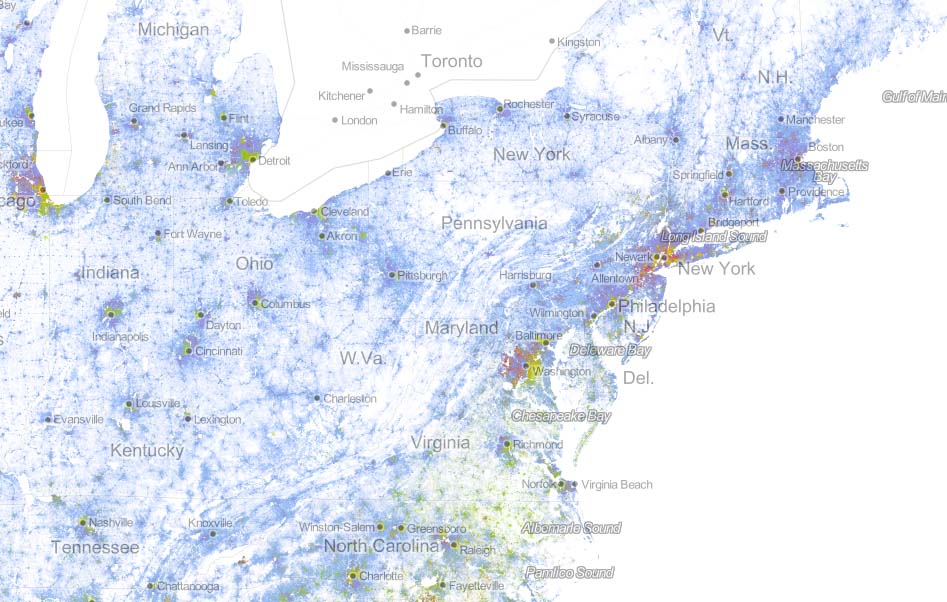Tools, Events, Courses
On events coming up this month, another shout out for OKcon, the big OFKN event in Geneva running from the 13th September. Tickets, programme and contact details here.
Other events in September include a free five week course on data mining and machine learning from some of the celebrities of the data mining world, the creators of Weka, a popular suite of machine learning software. Waikato University in New Zealand are offering a an online course starting September 9, 2013, with enrolments now open. The course teaches data mining and machine learning.
Some one-off courses are open in London’s UCL in September, good for those interested in mapping. UCL is hosting two free DIY aerial photography workshops. Using kites or balloons, participants can learn to make a composite aerial photograph with MapKnitter and potential uses for the data. On 7th Sept 14:00- 18:30. See the UCL excites programme or email cindy[dot]regalado[dot]11@ucl[dot]ac[dot]uk
Open Refine is a powerful and free tool for helping anyone clean up their data, view it, structure it, link it. Ruben Verborgh’s blog describes the new release of the software coming up in September and a guide book that helps make the tool easier to use for newbies.
Want to make your infographic a bit more exciting? Make it move. A video tutorial on how to animate infographics in After Effects is here by Klaas Diersmann.
Choosing a colour to use in your visualization shouldn’t just be an afterthought. Here’s an excellent blogpost on the possibilities and pitfalls of colour and where to start when you have to chose some.
And finally, want to make a simple static site quickly out of a Google spreadsheet or document? Try out Tarbell, a super-simple CMS built out of Google Drive, built by the Chicago Tribune News Applications Team.
Data stories
Could open data destroy us all? Alarmist but DARPA Defense Advanced Research Projects Agency, are looking into it, as Bloomberg report.
It’s ironic because the US government has a lot of data already as the recent NSA stories have shown. This nice infographic from the Washington Post visualizes the US government’s black budget – what the US spends on surveillance and security.
The New York Times is tracking you too… but to provide insight into reader behavior. Interesting to anyone working in journalism or user interfaces – this description of how the NYT tracks its readers gives some insights into how people behave, read and share online.
Still on New York, you can see just how popular the candidates are in Track NYC’s Mayoral race…
And the site TechPresident describes how a very simple open data tool telling people where their nearest polling stations were helped thousands more people to vote in South Africa and Zimbabwe.
Sean Ndlovu who worked on GotToVote! told the International Journalists’ Network (IJNet) that it has always been a long process to find a polling place in places like Kenya and Zimbabwe, and simply letting people know what the closest places are makes a difference. Report here.
And finally, an interview with a renowned Brazilian infographic designer Luis Iria.
Data sources
Some new datasets on datacatalogs.org include a curated set of open data for Zimbabwe.
And an open dataset from the Belgian city of Gent, aimed at fuelling smart city projects.
TOOLS, EVENTS & COURSES
Events – let’s kick off with OFKN’s own Open Knowledge Conference taking place this September in Geneva. Running since 2005, the theme this year is OPEN DATA – Broad, Deep, Connected. Speakers come from CERN, the World Bank, Columbia university and many other places. Tickets available now.
If you’re interested in the burgeoning field of the quantified self and its implications, and happen to be in San Francisco, check out the Quantified Self 2013 Global Conference. It’s where the global community of self-trackers and tool-makers gather to work out what they can measure and what they want to do with all the measurements when they get them. On October 10-11 and tickets are available now.
Looking for a job in visualization? Some useful advice from a pro over on the flowingdata blog.
You’ve probably seen a few guides to processing raw data. This one – ‘Data Processing and Visualisation Tools’ is from the EU. You may have heard of most of the tools before, but all the listed ones are free of charge and described clearly in this authoritative survey.
DATA STORIES
Why are there more potholes in rich neighborhoods? A fascinating paper looks into the politics of the open data movement in the UK – one of the world’s leaders in the field – and examines why the open data movement isn’t as politically neutral as it appears. The paper by Jo Bates of Manchester Metropolitan University is from 2012, but the implications continue to be relevant.
On finding the hidden biases in the system, an interesting article in the Guardian on how using algorithms to crunch data can magnify the prejudices of the programmer.
Don’t always trust your eyes: change blindness and afterimages are two effects to be wary of in data visualization. The Visual.ly blog explains.
The maker of this map has used a dot to represent one of every 309 million people in the US as counted in the 2010 survey. That’s 308,745,538 people and dots – to be precise. Coding each dot with the ethnicity of the respondent, he’s created a racial dot map of America showing distribution, integration and segregation. This page also includes a description of the methodology if you’re interested in how he did it.
The site GirlsDiscovered contains map-displayed data on the status of girls and young women worldwide in areas like leisuretime, education and economic opportunity.
Back to the quantified self. Fitbit, one of the leading companies in personal data used for health, lands $43 million in funding, a sign of the increasing opportunites in the sector according to Techcrunch.
DATA SOURCES
The week’s big news story is the Egyptian government’s crackdown on supporters of its now deposed democratically-elected President. The Guardian has kept an open Google spreadsheet on the Egyptian death toll as the army clears protest camps.
How open data can help development and social justice – a post from OkCon speaker Duncan Edwards, ahead of the Geneva conference.
The FullFacts website has published a new trove of information on health data in the UK. Datasets include the latest information on topics from drug use, STI statistics to how many people receive social care.
And check out this platform containing open source geospatial data from Malawi. Used to support development in Malawi MASDAP, a web-based data sharing tool launched in November 2012. Take a look and make a new map.
We’re rounding up data news from the web each week. If you have a data news tip, send it to us at [email protected].
COURSES, TOOLS & EVENTS
Here are some tips on visualisation from the best in science academia. A useful resource has opened up for one month at Nature.com where their columns on visualizing scientific data were made available to view for August.
Want to learn faster and get more done? This writer on Machined Learnings advocates using less data… to start with at least.
Looking for an introduction course to data science? London’s General Assembly will be holding one on the 19th August… a £20 introduction to the basics.
And there’s a funding opportunity from @Sciencewise – a resource center set up to help policy-makers in science and technology explain what they do better. See their call for proposals on how to advance open government through public dialogue.
DATA STORIES
Who lives where: Christians, Shia Muslims, Wahhabists – the Financial Times has mapped religious diversity in the Middle East.. a useful look at a complex region.
Another interesting visualization of global problems comes from John Beieler who has shown all global social disturbances since 1979 on a fast-moving timeline map. He used data from the University of Dallas which recorded daily disturbances worldwide for the past forty years to create this.
And on a less globally-significant level, this is what Reddit conversations look like, visualized with d3 and embedly.
And if you think your data visualisations are fancy: take a look at these from 13th century monks on the Visual Complexities blog. There are some striking similarities with today’s visual ideas.
You wait ages for a bus and then three come along at once? How Chicago city hopes to fix this age-old problem… by cutting bus crowding with data.
SOURCES
New York City has released some very detailed datasets on land use, including very detailed maps of the waterfront, information about taxes and political boundaries.
And finally, the University of California inches closer to open – and free – academic publishing.
After 6-year-long fight with the for-profit academic publishing industry, the University of California Senate approved open access standards for research, Techcrunch reports.
We’re rounding up data news from the web each week. If you have a data news tip, send it to us at [email protected].
]]>TOOLS, COURSES AND EVENTS
Is your data bullet-proof? Keep a log of what you do, check with a random sample, avoid false precision in reporting. A handy guide to bullet-proofing your data from Propublica is published here.
Are you a journalist or activist looking to brush up on the basics of statistics? Here’s an easy-to-read primer with examples drawn from baseball on the key principles from Dave Stanton, designer/developer and Poynter Technology Fellow.
Wondering how to run a financial analysis using Python? Thomas Wiecki of Brown University provides a tutorial taking you through data analysis tools relevant for financial analysis in Python, from scraping data from Yahoo Finance to building state-of-the art trading algorithms.
Matching up data scientists with charities and social enterprises, Data Kind UK is bringing top-notch data expertise into the voluntary sector with a data drive this weekend in London. Look out for the tweets as charities delve into the potential of the data they hold.
Got some software that needs documenting? Want a bunch of experts to help you in an all expenses-paid week at the Googleplex in Mountain View? Apply for the 2013 GSoC Doc Camp, open to proposals now. The camp aims to improve free documentation materials and skills in free software projects.
Women in Data is holding a meetup in London in August with a tutorial on how you can get Hadoop and R to play together nicely to crunch huge datasets and end up with a map. Open to sign-ups now.
DATA STORIES
Do we need more people with skill sets that straddle design and data? Yes we do, says Nicholas Felton at Wired.
Washington Post configures the world’s demographic future in 9 charts… and it’s all about Africa.
How do members of the EU parliament vote? Who is the most popular one? Here’s a catalogue of MEP voting records from the current parliamentary term. And a poll by the site’s members reveals the most popular MEP..
Chinese food: just how is the kind of soup you get in Sichuan province different to what you’d get in Beijing? The great minds at MIT have been comparing Chinese cuisine by pooling information from recipes and working out how they are related. The results are here.
DATA SOURCES
The Guardian has taken data on every registered refugee since 1960 from the UNHR and visualized it in a map that shows what years suffered the worst displacements and who has moved where. They have also packaged the data up and made it available to download.
Here’s the US 2010 census data in an easy to use format, aggregated to a Zip code level. Developing company Gilt Tech, has gone in and organized data from the US Census – putting the parsed and ZIP-code aggregated file on public release.
Is the statistical data from the Czech Republic’s 2011 census online? Yes it is.
We’re rounding up data news from the web each week. If you have a data news tip, send it to us at [email protected].
]]>TOOLS, COURSES AND EVENTS
Yes, the OKF’s Open Spending Party is taking place right now. Follow updates from initiatives all over the world on the Open Spending Twitter account.
Data science courses have got serious. Registration opened this week for Berkeley UC’s new 100% online MA in data science, the first data science masters to be fully virtual, they claim. Meanwhile the Financial Times reports that big data analysis is now a crucial part of MBAs, with modules in big data analysis now a routine part of the course at the big universities.
Freedom of information requests are vital for investigative journalism, but fiddly to do. The FOIA machine – a program created by the Center for Investigative Reporting can submit one for you. The Center is raising money to truly open up the FOI system by building a really simple UI for the program. They’ve launched a kickstarter campaign to fund the new interface.
Been wondering how to convert a Shapefile to a Google Fusion table, so the geographical reference data in the Shapefile can be imported straight into a Google map? There’s a tutorial here.
DATA STORIES
American radio station NPR has investigated a project mapping Kenyan slums. The mappers explain the value to the locals that a very basic map brings.
Further to last week’s look at how tweets could predict conflict, author Patrick Meier has published further about how useful Twitter is during times of crisis. Patrick and colleagues at QCRI have developed a dashboard that allows tweets to be analysed and monitored. Piling in stored tweets from the Hurricane Sandy crisis has allowed them to model what happens to tweets and hashtags in a crisis. “The appearance of a new hashtag can reveal a new problem or need while a rapid increase in the frequency of some hashtags can denote the spread of a problem”, he writes. See more on his blog.
It is easier to check code on the go: Github has a freshly redesigned mobile website, promising easy access to code repositories and much faster loading times.
TechCrunch’s Crunchbase – a store of startup business data – has been reimagined visually, making it easier to see who gets what funding and where from.
And finally newsroom developer, Michelle Minkoff explains why you should take your computer science skills to a newsroom rather than a standard IT company.
DATA SOURCES
The US government’s data portal, has had a big redesign reports visual.ly and the new version is out in beta at next.data.gov. Compared to the current site, the redesign offers access to data straight off the front page and a rotating wheel of inspiring visualizations. They’re looking for design suggestions via Twitter…
Canada has cleaned up its financial data – the Government Finance Statistics – to tally with new IMF standards which will make international finances easier to compare.
And Baltimore city has put all its legislation on Tumblr – making it easier to find, and use, for citizens.
We’re rounding up data news from the web each week. If you have a data news tip, send it to us at [email protected].
]]>




